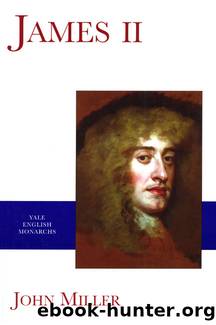James II (The English Monarchs Series) by John Miller

Author:John Miller [Miller, John]
Language: eng
Format: azw3
ISBN: 9780300087284
Publisher: Yale University Press
Published: 2008-09-30T16:00:00+00:00
CHAPTER TEN
King and Parliament (February to November 1685)
Three days after Charles died, James announced his intention to summon a Parliament. He also announced that he would continue to collect the revenues voted to Charles for life and that he had no doubt that Parliament would vote the same to him. Some thought this very irregular. It was normal for a new king to collect the customs before his first Parliament met, but Charles II had been the first king to be granted the excise, so there were no precedents for its collection at a new king's accession. For this reason, a new contract for the collection of the excise had been sealed the day before Charles died and the judges ruled (by a majority of eight to four) that the contract was valid. On 16th February James issued a proclamation publicizing this ruling and, despite a few grumbles, found little difficulty in collecting Charles's revenues.1
These proceedings reflected not contempt for the laws, but uncertainty about how Parliament would behave. The last Parliament had been almost hysterically exclusionist. Since then the Tories had been given a monopoly of local and municipal office, but until the elections were held and Parliament met, James could not know what its mood would be. He feared that it would either grant his revenues only for a limited period or attach unacceptable conditions to its grant (for example, new measures against Catholics).2 To meet this danger and to strengthen his financial position, James and his ministers asked Louis for a subsidy, claiming that Louis had not yet paid over all that he had promised to Charles. Louis eventually agreed to pay these arrears, but James, Rochester and Sunderland used every possible argument to persuade Barrillon that Louis should pay more. They pleaded, they wheedled, they grovelled. Barrillon passed on their argument, adding that he thought a further subsidy would fix James inviolably in Louis' interests, but that if Louis refused, he did not know what James's pique might lead him to do. Louis sent him about £150,000, but with strict orders not to pay it over until he saw how Parliament behaved.3
From James's point of view, the elections were very successful. Burnet claimed that “in all England it would not have been easy to have found five hundred men so weak, so poor and so devoted to the court as these were.” Burnet, however, was the last man to welcome a solidly Tory House of Commons and the Tories were naturally delighted: “Such a landed Parliament was never seen,” wrote Ailesbury smugly. The Tories had seen little cause for anxiety in the first three months of James's reign. True, James had insisted on going openly to Mass, arguing that it would be timid and dishonest to hide his beliefs; some Tories, like Evelyn, agreed with him. More worrying, perhaps, were his attempts to persuade his ministers to accompany him to his devotions at Easter. Sunderland went as far as the chapel door, but Rochester chose to go into the country for the holiday.
Download
This site does not store any files on its server. We only index and link to content provided by other sites. Please contact the content providers to delete copyright contents if any and email us, we'll remove relevant links or contents immediately.
| Automotive | Engineering |
| Transportation |
Whiskies Galore by Ian Buxton(40344)
Introduction to Aircraft Design (Cambridge Aerospace Series) by John P. Fielding(32340)
Small Unmanned Fixed-wing Aircraft Design by Andrew J. Keane Andras Sobester James P. Scanlan & András Sóbester & James P. Scanlan(32143)
Craft Beer for the Homebrewer by Michael Agnew(17448)
Turbulence by E. J. Noyes(7043)
The Complete Stick Figure Physics Tutorials by Allen Sarah(6641)
Kaplan MCAT General Chemistry Review by Kaplan(6057)
The Thirst by Nesbo Jo(5788)
Bad Blood by John Carreyrou(5773)
Learning SQL by Alan Beaulieu(5414)
Weapons of Math Destruction by Cathy O'Neil(5039)
Man-made Catastrophes and Risk Information Concealment by Dmitry Chernov & Didier Sornette(4739)
iGen by Jean M. Twenge(4702)
Digital Minimalism by Cal Newport;(4549)
Life 3.0: Being Human in the Age of Artificial Intelligence by Tegmark Max(4510)
Audition by Ryu Murakami(4100)
1,001 ASVAB Practice Questions For Dummies by Powers Rod(4040)
Electronic Devices & Circuits by Jacob Millman & Christos C. Halkias(4032)
Pale Blue Dot by Carl Sagan(4006)
